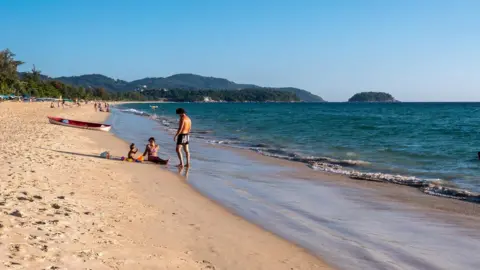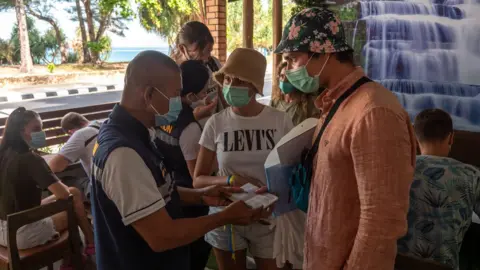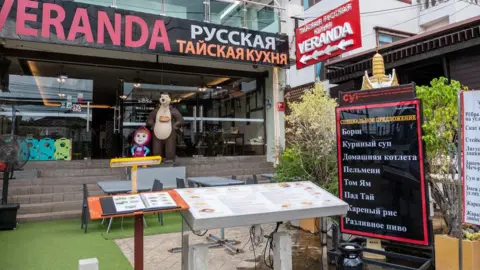The Russians trapped on a Thai island as war rages in Ukraine
 BBC
BBCFew places have been as affected by the collapse of tourism in Asia as Phuket, an island less than 50km (31 miles) long, whose famous beaches used to attract around seven million overseas visitors a year.
For more than a year after Covid struck, Thailand more or less shut its borders, imposing strict quarantine requirements on anyone arriving from abroad. More than half of the nearly 200,000 tourism-related jobs on Phuket vanished.
Last year the Covid restrictions were gradually relaxed, but the country that has been Thailand's biggest source of overseas tourism, China, is still making it very difficult for its citizens to travel.
In their place Russians have become the largest group among foreign visitors to Phuket, and about 17,000 arrived in December.
As you walk around Phuket's top beaches, Karon, Kata and Patong, you cannot miss the evidence of the recent Russian tourist boom; signs in Cyrillic script, and restaurants offering a taste of home with borscht and pelmeni dumplings on the menu.
But now the invasion of Ukraine has stranded around 7,000 Russians in Thailand, many on Phuket, as many airlines have cancelled their flights home.
Money is the biggest problem confronting them. Since the sanctions have been imposed on Russia they have been unable to withdraw cash from ATM machines or use their credit cards.
Most do not want to speak to journalists, but one couple did agree, if we did not identify them. They worried about repercussions back home, where even calling the events in Ukraine a war can result in prosecution.
They told me they had flown to Phuket from Moscow on the day the invasion started, and are now trying to stay in Thailand as long as their money lasts. They are both horrified by the invasion.
"We were going from bank to bank, from ATM to ATM. Nine times out of 10 it was declined, but we managed to get some cash.
"There were some other means to get it, like Western Union or cryptocurrency, but it is closing every day. If something was working yesterday, it is not working today."
'Every day we watch the news'
For the smaller number of Ukrainians who found themselves in Thailand when Russian forces began bombing their cities, the situation is even worse.
I met Anton and Alina at a beachside hotel which was being used as a temporary immigration office by Thai officials helping to extend the visas of those who cannot leave the country.
They were among a dozen Ukrainians whose lives have been upended by the war. They had been travelling in Thailand since December, and were supposed to fly back to Kyiv in mid-March, but their flight was cancelled, and their families are urging them to stay overseas as long as possible.
"We can't relax here, we can't enjoy swimming in the sea", said Alina. "Every day we watch and read the news. Unfortunately we can't help our families by going back there."

Alina says her family is in a relatively safe part of Kyiv, but they have still heard Russian missiles striking not far away. For them, it brings back memories of when they had to leave their home city of Donetsk after the conflict started there eight years ago.
Anton's family have left Kyiv and moved close to the Hungarian border, so they can cross if the situation deteriorates.
Another young woman, who introduced herself as Yulia, came up to me in tears, and showed images on her phone of the destruction in her own city, Irpin, outside Kyiv.
Her family has moved into Kyiv, she said, but she was too upset to tell me any more. The stranded Ukrainians are all being offered 90-day visa extensions, but some of them worry that their funds will run out.
Local businesses and officials are finding ways to help these tourists.
The Ukrainian Embassy in Thailand says it has received more than 100 offers of no-cost accommodation from Thai residents. The Thai government is trying to find other ways for Russians to move funds out here to pay for their stay, including using international transfer apps and the local banking system.
When we visited the Veranda restaurant in Karon at lunchtime, with its large plastic bear statue welcoming us at the door, there were just two tables occupied.
"Around the new year we were packed, every day," said the manager Dee. "But our customers can no longer withdraw the funds to pay for their meals."
The restaurant's Russian owner is instead offering customers the option of payment by transfers through cards issued by Russian banks like Sberbank, Alfa and Tinkoff.

The Russian couple I met is staying in a budget-priced hotel owned by a Danish company, Plan-B.
Co-owner Toke Terkelsen said he is now offering discounts to his Ukrainian and Russian customers, or the chance to move into cheaper rooms. He has allocated a hostel with free beds to those who have run out of cash.
Hopes for a tourism revival
Out on the glorious beaches you still hear Russian spoken more than any other language. There are visitors here from Kazakhstan, from Siberian cities like Omsk, Irkutsk and Novosibirsk, all escaping the cold northern winter.
But their numbers are just a fraction of those who used to come before Covid, and they are dwindling.
Over the next few weeks the Thai government and Russian Embassy say they will explore alternative ways of getting stranded Russians home, either through special evacuation flights or using airlines which are still flying there.
Once they are gone, the long hoped-for tourism revival in Phuket will be stalled again, waiting perhaps for more Europeans, for Indians and eventually, for the Chinese to start coming back in the numbers they once did.
Toke Terkelsen is confident that will happen soon.
"Even with what's happening right now in the world, you still have a lot of people who have been staying at home for two years, who have saved some money and really want to go travelling," he said.
"If Thailand opens up as the main gateway for Asia, and still the other countries are closed, you will see a lot of people coming to Thailand."
You might also be interested in:
The BBC spoke to young Thai workers in Phuket last year as the island prepared to re-open its beaches ahead of the tourist season.
